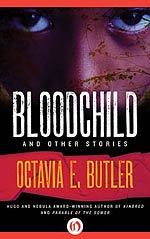
![]() Bormgans
Bormgans
11/26/2019
![]()
(...)
The Evening and the Morning and the Night (1987, 33 pp.)
The opening pages are outright fantastic. Again Butler succeeds in creating mood expertly. Again echoes of oppression: the story is about people with a particular disease that are forcefully sterilized and have to wear emblems. It's a good story, plain and simple. I do think it's a bit formulaic in the part that hinges on the fact that destructive energy is being transformed into creative energy.
In the afterword, she writes this story was born "wondering how much of what we do is encouraged, discouraged, or otherwise guided by what we are genetically." She goes on and adds: "This is one of my favorite questions, parent to several of my novels." In my analysis of Dune a few weeks ago, I wrote that "I have long held the suspicion that what underlies big parts of literature is the way we relate to us being determined." Butler seems to confirm this, but as an analysis of the matter her short story fails at depth. Genetics is only one factor in the determination equation.
At face value, this is a story about someone who's emphatic enough to see the hidden powers of people that are feared, criminalized, misjudged & underestimated. Again, Butler being black cannot be separated from its interpretation & reception.
(...)
All and all a varied collection of which the 4 longer stories are worth it, Speech Sounds being my favorite. Butler's stories are not successful on all accounts, but they are solid for sure, except for the abysmal The Book of Martha.
A final, crucial remark... This collection didn't convince me to start one of Butler's long form novels, and I can't really explain why. Maybe because I felt lectured at times - Butler being overall too transparent about her social & ethical intentions?
For a write-up of each story, please visit Weighing A Pig
https://schicksalgemeinschaft.wordpress.com/2019/11/25/bloodchild-and-other-stories-octavia-e-butler